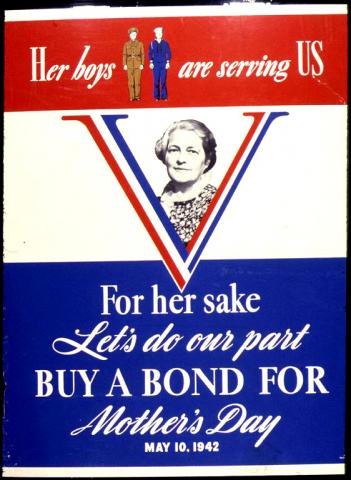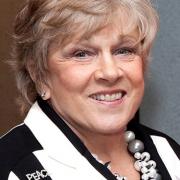English

Image Credit: U.S. National Archives, World War II bond advert.
Let's get serious about Mother's Day. Not about the pretense: we all know that drill; it's not really about the flowers and dinners, etc. The real story is much more stark, but also quite sensational.
A woman proposed it: an assertive woman who was not looking for gifts and attention, but who wanted wars to end. Julia Ward Howe famously wrote in 1872:
We will not have questions answered by irrelevant agencies,Our husbands will not come to us, reeking with carnage,For caresses and applause.Our sons shall not be taken from us to unlearnAll that we have been able to teach them of charity, mercy and patience.We, the women of one country,Will be too tender of those of another countryTo allow our sons to be trained to injure theirs.
Mrs. Howe worked with families on both sides of the Civil War and had seen some of its worst effects in the deaths, the disease, and the maimed soldiers. The economic devastation following the war was widespread -- with crises in both the North and the South. She knew the vast effects of war go that beyond battle.
In 1870, Mrs. Howe determined that peace was one of the world's most important causes. She called for women to rise up and to come together across national lines, to recognize what we hold in common above what divides us, and to commit to finding peaceful resolutions to conflicts. She issued a Declaration, hoping to gather together women in a congress of action.
The play Lysistrata famously featured women withholding sex from their lovers to end a war. Do you recall that there were real-life Russian women who, after years of war in Afghanistan, went onto the fields there to drag their men home? They were tired of it. They were not winning, and these were not jobs.
More recently in 2003, Liberian women led a crusade against their country's conflict by withholding sex; then they forced the men who were lazily negotiating a peace agreement to speed up the process by encircling the building and not letting them out until they had a peace accord. It's a long story, full of heroines, but also of treachery and pain. Leymah Gbowee received a noble peace prize in 2011 for leading that effort.
I don't ever see Mother's Day bringing a massive women's rally against war, but I do wish we could. In this country, we honor our soldiers, both men and women. Yet, and this is a big YET, sometimes we must say "Why?" Which wars are worth the pain? The loss of blood and treasure? Would it not be a great day for mothers, and for fathers, not to have wars raging? Sons and daughters dying?
There are many who think that war is the only way to solve conflicts. Teddy Roosevelt, one of the more pugilistic presidents, said, "Speak softly and carry a big stick." No one doubts that the U.S. has many big sticks. But speaking softly requires intelligence, patience, knowledge and the wherewithal to know full well what the outcomes of using those big sticks will be.
In today's world, 90 percent of the victims of war are civilians, and 70 percent of those are women and children and the elderly. Before the new style of war which fights in backyards, community and religious centers, farms and villages; soldiers were the victims. We have been fortunate not to have war raging on our soil. If we did, how long would it be before we would be dragging our loved ones away from the battle?
Waging war is big business. Lots of money is made from preparing troops, guns, planes, bombs and ships. During World War II, factories stopped making their goods in order to make what was needed for war. They then returned to normal after the war. Now, factories are always at work making war stuff. It is part of our economy. And it is funded by us all with our taxes. Out of the discretionary budget that Congress appropriates each year and goes to all those things we love like education, health care, a clean environment, veterans benefits, etc. the Pentagon takes up 53 percent, plus, a slush fund for future wars.
I like Mother's Day, I really do. I love getting scribbled cards from my grandchildren and the thoughtful notes from daughters and my sons-in-law. I like wishing my mother were still here and I think about how much she did not like being celebrated for something she already thought was a gift. I like knowing if there were a mad rush to march against endless war, she would be there, as might millions more who decided it should be, as originally envisioned -- a mother's day for peace.
[Image Credit: U.S. National Archives, image is in the public domain.]


The views and opinions expressed in this post are those of the author(s) and do not necessarily reflect those of MomsRising.org.
MomsRising.org strongly encourages our readers to post comments in response to blog posts. We value diversity of opinions and perspectives. Our goals for this space are to be educational, thought-provoking, and respectful. So we actively moderate comments and we reserve the right to edit or remove comments that undermine these goals. Thanks!